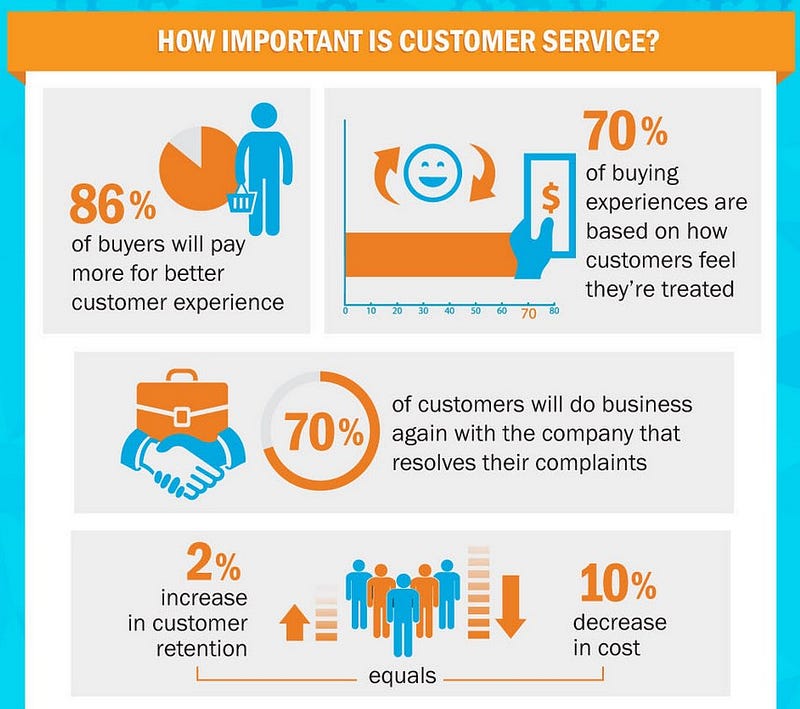Last Updated on September 1, 2023 by David
Why Training and Development is Crucial for Customer Service

Customer service is the prime player in any successful business, but so many organizations overlook the training and development needed for a customer service program that excels. At the very basic foundation, customer service is exactly what it sounds like — servicing customers to entice them to return and keep using your products and/or services — and while it might sound like something that can be done easily, this is an area that greatly benefits from training and development.
Why Great Customer Service Matters
While customer service might seem like one of the easiest jobs in an organization, there are many responsibilities and requirements of those fulfilling the positions. It’s a job that, depending on how it’s handled, can keep customers or scare them away. Granted, a lot of what makes customer service representatives right for the job isn’t necessarily what they learned in their educational career.
In the midst of the COVID-19 pandemic, great customer service skills matter even more because nearly every job has turned into a service position of some kind. Not only that, but they have also turned into remote jobs. If your employees are not used to working remotely, it’s up to you to help them learn those skills too.
Many customer service skills depend on soft skills like being able to make conversation and reading the people you’re speaking to. In fact, a recent LinkedIn study showed communication being number one in top most-valued soft skills. This helps the customer feel at ease and helps with trusting the organization more. However, just because soft skills can’t be taught is not a reason to slack on training and development for those who work in customer service.
A program that helps your employees learn the why and the value behind your processes allows them to continue to grow along with the organization. Plus, training and development programs are a great way to make employees feel valued. It shows them that your company values what they bring to the table.

When you put a clear plan in place to help improve your customer service representatives’ skills you achieve a few things. For one, those who excel at customer services aid in the retention of your current customers. Retaining customers is cheaper than trying to gain new ones. Returning customers have a higher probability of spending more on your product and services. They’re already familiar with what you can provide and they’ve already completed the research phase of the customer’s journey.
Secondly, good customer service representatives create happy customers. Nobody wants to deal with inflexible employees when trying to buy a new product. Flexibility helps customers feel valued and results in their return over time. Plus, loyal customers are a great advertisement on their own. It’s something that doesn’t take away from your marketing budget, and word of mouth is one of the top ways to gain new customers.
Finally, in an age where technology seems to be taking over in a lot of areas, giving customers the opportunity to speak to an actual agent gives you a leg up on your competition. Many organizations let customer service fall to the wayside as they begin to focus more and more on numbers. The use of answering services can be more cost-efficient but it also results in the loss of a human connection between customers and the company. It’s not ideal, but it happens more often than we’d like to admit. Having a training and development program to encourage customer service representatives to continue to increase their skills is an excellent benefit in any workplace.
Use that same technology to train your employees to work remotely in this new work climate. The more you can immerse your employees in remote work, the faster it will be for them to learn the skills necessary to work in decentralized environments. They were likely already partially there — many customer service jobs involve phone calls or chatbots and very little interaction with peers. Remote skills for customer service employees means training them to communicate regularly with you, the employer. It also means that one of the greatest things you can do for them is to check in regularly with your employees. Because of COVID-19, many employers have not had the option to phase in remote work; thus, clear and open lines of communication have been key to a swift pivot to remote work.
A Plan for a Training Program
Just like with anything else in business, improving the customer service areas of your organization requires a well-thought-out plan. This means it can’t be a mesh of different employees from different departments trying to decide what best works for customer services because they all have their own individual departments in mind. Appointing someone as Chief Learning Officer (CLO) is one of the smartest moves you can make as you develop a training program. This means that creating training and development programs is their sole responsibility and it helps eliminate everyone throwing their opinion into the mix.
CLOs are usually positions that only some of the larger organizations have, but they’ve proved to be invaluable. Companies like American Express employ chief learning officers to help enhance the training and development processes for employees. These employees take a look at the company as a whole and work on a plan that benefits all departments equally. Plus, chief learning officers also look at how they make employees better learners. This involves taking a look at the best ways employees retain information and what teaching techniques would be most beneficial to them.
Once you have a plan in place for a training and development program, you can begin to implement it. Your employees will not only feel more valued as an employee, but they’ll also be able to see how their role is crucial to the business overall. It wasn’t long ago that customer service representatives were looked at as glorified secretaries, answering phones and transferring calls, but as customer service in general lately has seemed to have taken a hit, it’s only now that so many organizations are beginning to understand the importance of the role.
Customer service isn’t repeating a script back to customers on the phone and it’s certainly more than just answering calls. When companies put the training and development of their customer service representatives close to the top of the list of important aspects to care about, the big picture and an even bigger profit start to form right in front of our eyes.
About Re:amaze
Re:amaze is a modern helpdesk and customer messaging platform designed to help eCommerce businesses boost customer happiness and revenue. Re:amaze allows all customer-oriented teams to work together in a shared inbox through email, social, SMS, voice, and live chat. Re:amaze also comes packaged with automated messaging and chatbots so eCommerce brands can succeed at the front lines of conversational commerce.
About Noah Rue
Noah Rue is a journalist and a digital nomad, fascinated with the intersection between global health, personal wellness, and modern technology. When he isn’t searching out his next great opportunity, Noah likes to shut off his devices, head to the mountains and read novels based in the American Southwest.
